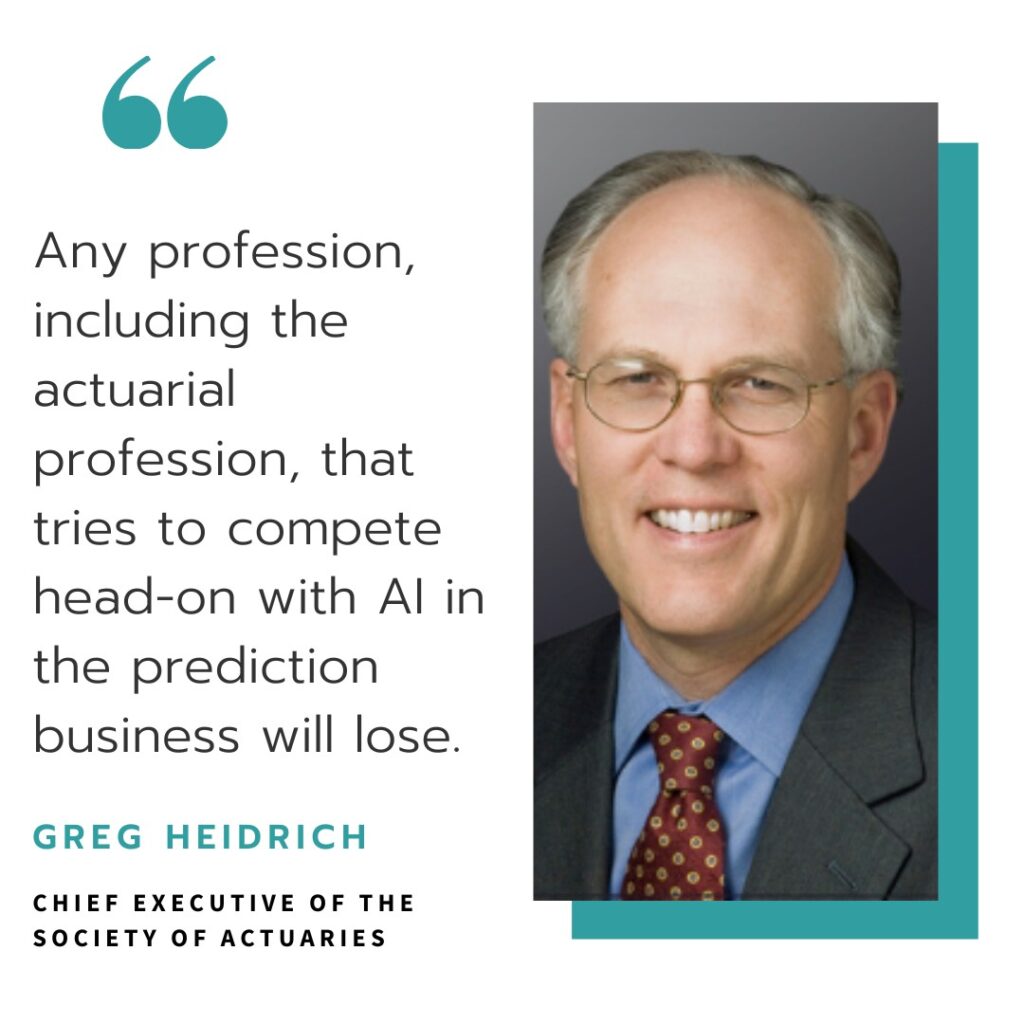In a world where technology is advancing rapidly, questions about job security arise. One such profession under inspection is actuarial science.
Will actuaries be replaced by AI?
Let’s delve into this topic to understand the role of artificial intelligence in the future of actuarial work.
Table of Contents
Things you should know beforehand
Before delving into our main topic of whether AI will replace actuaries, let’s first understand 2 topics; what actuaries do and how AI will augment actuaries in their everyday tasks.
What do actuaries do?
Here are some of the prominent tasks that actuaries perform;
- Analyze statistical data: Actuaries analyze large sets of data to identify patterns and trends, enabling them to estimate the probability and likely cost of future events.
- Design insurance policies and pension plans: They develop and price insurance policies and pension plans based on their assessments of risk and financial factors.
- Assess financial risks: Actuaries evaluate risks in various sectors, including insurance, healthcare, and finance, to help companies make informed decisions.
- Develop mathematical models: They create mathematical models to predict future trends and outcomes, using advanced techniques to simulate complex scenarios.
- Communicate complex findings: Actuaries play a crucial role in translating complex statistical and financial analyses into understandable insights for stakeholders.
At the core, actuaries use statistics, mathematics, and financial theory to solve real-world problems related to risk and uncertainty, ensuring the financial stability and security of individuals and organizations.
How AI Will Help Actuaries?
Here are a few prominent ways by which AI will augment actuaries;
- Data analysis: AI algorithms can process large volumes of data quickly and accurately, helping actuaries to analyze complex datasets more efficiently.
- Predictive modeling: AI techniques such as machine learning enable actuaries to develop more accurate predictive models, leading to better risk assessment and pricing strategies.
- Automation: AI-powered tools can automate repetitive tasks, freeing up actuaries to focus on more strategic and value-added activities.
- Risk management: AI systems can identify potential risks and anomalies in real-time, allowing actuaries to proactively manage risks and optimize decision-making.
- Personalized solutions: AI can analyze individual customer data to tailor insurance policies and financial products to specific needs, improving customer satisfaction and retention.

AI has the potential to revolutionize the actuarial profession by enhancing efficiency, accuracy, and innovation in everyday tasks.
Will Actuaries Be Replaced By AI?
Now let’s discuss the crucial topic at hand of whether actuaries will be replaced by AI or not.
In short, the answer is No, AI will not replace Actuaries.
But to say that AI will have no effect on the actuary market is a nonsensical statement.
As we discussed earlier, AI is going to augment actuaries and will help them tremendously in their everyday tasks to improve their productivity. This means that now with the help of AI tools, an actuary can accomplish much more than he or she could in the pre-AI era.
If it took 10 people to accomplish an actuary task before, now it will take just 2 or 3 actuaries to do the same work in the same amount of time. Hence, a smaller number of actuaries will be required to perform the same job or project. The outcome would be a reduction in the overall actuary job market, and there would be fewer and fewer jobs and freelance projects every year.
Hence, the actual effect AI will have on the actuary market will be a reduction in size, not replacement.
What Should An Actuary Do In This Transformative Landscape?
AI is going to transform the field of actuary, whether you like it or not. So the best course of action is to adapt to the change rather than resist it. Because if you don’t, someone else will and they will be the one replacing you.
So it is not the AI, but an actuary who uses AI will replace you.
As an actuary, you might be wondering, “What should I do in this AI revolution?”.
Here are a few of the things that you can do;
- Learn AI Applications in Actuarial Science: Actuaries should dedicate time to understanding how AI can specifically enhance actuarial tasks such as risk modeling, pricing analysis, and claims prediction.
- Develop Proficiency in AI Tools: Actuaries should acquire skills in using AI software and platforms relevant to their field, such as machine learning algorithms and predictive analytics tools.
- Adapt Actuarial Models: Actuaries should adapt traditional actuarial models to integrate AI-driven insights, leveraging data-driven approaches to improve accuracy and efficiency.
- Collaborate with Data Scientists: Actuaries should collaborate with data scientists to leverage their expertise in AI and machine learning, fostering interdisciplinary teams to tackle complex problems.
- Stay Ethically Conscious: Actuaries should remain vigilant about ethical considerations in AI applications, ensuring fairness, transparency, and accountability in decision-making processes.
By focusing on these specific actions, actuaries can effectively harness the power of AI while maintaining the integrity and relevance of their profession.
What Others Are Saying About AI Replacing Actuaries?
According to the U.S. Bureau of Labor Statistics, the job outlook for actuaries is promising, with a projected growth rate of 23% from 2022 to 2032, much faster than average.
However, there are concerns about automation, as indicated by data from the “Will Robots Take My Job?” website, suggesting a 52% automation risk level based on calculation and 41% based on polling.
In an article from Actuarial Review magazine, Editor-in-Chief Jim Weiss emphasizes the need for actuaries to envision and prepare for their future in a job landscape defined by AI. He suggests that even novel roles like manager may not be immune to automation, as AI can approximate skills such as creativity. However, Weiss also notes that employers may not necessarily opt for AI alternatives, and actuaries themselves would play a key role in training AI to scale greater heights.
In a Q&A with McKinsey & Company, Society of Actuaries’ Chief Executive Greg Heidrich acknowledges the impact of AI on the actuarial profession. He highlights the importance of actuaries complementing AI predictions rather than competing directly with them. He emphasizes the need for actuaries to develop flexibility, adaptability, superior business judgment, and sharp communication skills to navigate the evolving landscape of AI and advanced modeling techniques.

Ultimately, amidst concerns about automation and AI, actuaries are advised to focus on what they can control. By creating a better future for their stakeholders and continuously developing their skills, actuaries can adapt and thrive in a world increasingly shaped by AI technology.
Conclusion
In conclusion, while the role of AI in actuarial science is undeniable, actuaries won’t be replaced by AI. Instead, AI will augment their capabilities, enhancing productivity and efficiency.
However, this transformation will likely lead to a smaller job market for actuaries, necessitating adaptation to the changing landscape.
By embracing AI, acquiring relevant skills, and collaborating effectively, actuaries can navigate this shift and continue to excel in their profession.
Frequently Asked Questions (FAQs)
Will AI replace actuaries?
No, AI will not replace actuaries. Instead, AI will augment their capabilities and enhance productivity.
How will AI assist actuaries in their everyday tasks?
AI will assist actuaries by improving data analysis, predictive modeling, automation of repetitive tasks, risk management, and providing personalized solutions.
What impact will AI have on the actuarial job market?
AI will likely lead to a reduction in the size of the actuarial job market, as fewer actuaries will be needed to perform the same tasks with the assistance of AI.
Is there a future for actuaries?
Yes, there is a future for actuaries, especially as they adapt to leverage AI and emerging technologies.
Can AI accurately predict risk better than actuaries?
AI can enhance risk prediction, but actuaries play a crucial role in interpreting and applying the insights generated by AI.
Will AI reduce job opportunities for aspiring actuaries?
AI may reshape job roles, but aspiring actuaries who adapt to AI technology and develop relevant skills will still find opportunities in the field.






